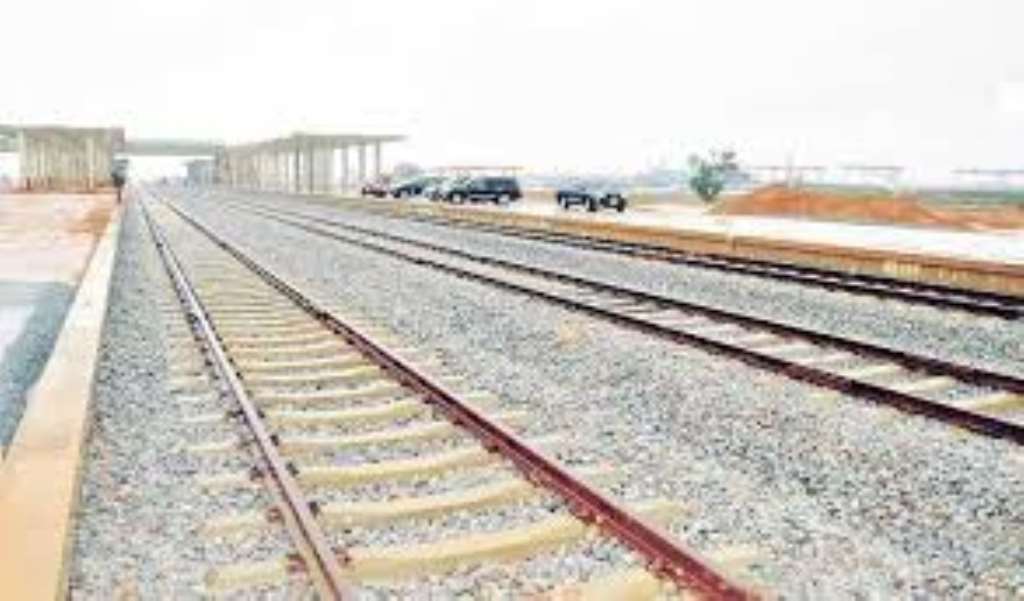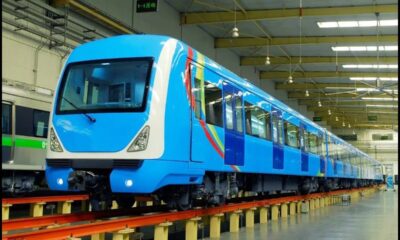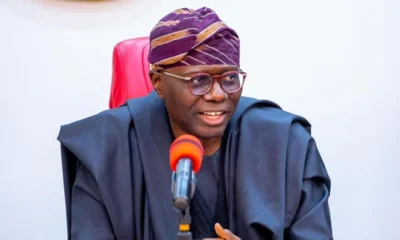Railway
Lagos blue rail to begin commercial operation next month

The just completed Lagos light rail also known as the Blue Line will be put to commercial operation in January, the state governor Babajide Sanwo-Olu, has said.
He also said said the construction of the second phase of the rail line, covering 14-kilometre from Mile 2 to Okokomaiko, would be launched immediately after the inauguration of the first phase next month.
According to Gboyega Akosile, the governor’s chief press secretary, exactly 1.31pm on Wednesday, history was recorded in Lagos as Governor Sanwo-Olu formally stepped into the coach of the newly completed Lagos Blue Line and took the first trip aboard the electric-powered rail infrastructure.
The governor led his deputy, Dr Obafemi Hamzat, Speaker of Lagos State House of Assembly, Mudashiru Obasa, members of the state executive council, journalists and select members of the public on a ride from the National Theatre Station to the iconic Marina Station.
The trip took approximately 10 minutes.
For the first time, a rail infrastructure traverses the western part of the state and the Lagos Island.
The first passenger trip marked the completion of civil infrastructure work on the Lagos Rail Mass Transit (LRMT) being constructed by Lagos Metropolitan Area Transport Authority (LAMATA).
The completed tracks, spanning 13 kilometres in the first phase, extend from Mile 2 to Marina, covering five stations. The construction started in 2010 under the administration of Governor Babatunde Raji Fashola. It experienced some delays in the succeeding administration, before the current government continued from 2019.
Sanwo-Olu, excited about the development, declared the end of construction on the Blue Rail Line project, keeping to the December 2022 deadline.
The rail infrastructure, he said, is now ready for commissioning in January by President Muhammadu Buhari.
The governor said the milestone was a culmination of “impactful reforms” initiated in the State’s transport ecosystem, which started at the beginning of the fourth republic under the administration of his predecessor, Asiwaju Bola Ahmed Tinubu.
Sanwo-Olu described the moment as “historic”, saying Lagos became the first sub-national government in Africa to fund and deliver a rail system from the state’s balance sheet.
He said, “The completion of the infrastructure for the first phase of the Lagos Blue Line rail is a strong testimony of our commitment to building on the legacies of past administrations, and the pioneering vision of Asiwaju Bola Ahmed Tinubu.
“This milestone in the development of the Lagos Rail Mass Transit (LRMT) is the culmination of several impactful reforms in the transport ecosystem of Lagos, starting in 1999.
“The Tinubu administration developed the Strategic Transport Master Plan (STMP), which laid out the foundation for a network of robust and modern transport infrastructure befitting the 21st century city.
“The master plan has six rail lines and one monorail, 14 Bus Rapid Transit (BRT) corridors, over 20 water routes and a number of major new roads. Central to the implementation of the transport master plan is LAMATA established in 2002.
“Over the last two decades, that master plan has been faithfully implemented by successive administrations. Today, we are making history with the completion of historic rail line, which is the first phase of the Blue Line.
“The road to the completion of this project, no doubt, has had an interesting story of delays, which were not due to a lack of enthusiasm or commitment on the part of the state government. Now, we have put the challenges behind us; from now on, we will focus on the benefits of this project for our people.”
After commissioning, Sanwo-Olu said passenger operations would not commence until the project undergoes necessary test-run and proper security measures put in place along the rail corridor.
The governor said the state had already taken the delivery of the three sets of wagons that would be used for passenger operations.
The completed rail infrastructure, he said, has the capacity to move 250,000 passengers daily.
When the second phase is completed, he said the entire project would take 500,000 people daily.
Sanwo-Olu said his administration’s vision for an integrated transport system, as enunciated in the T.H.E.M.E.S agenda, was beginning to be a reality, stressing that the transportation plan of his government was a multimodal approach that would bring road, rail and waterways together for seamless mobility.
The governor acknowledged the effort of his predecessor, Babatunde Fashola, toward bringing the vision to life.
He also thanked the leadership of the Central Bank of Nigeria for allowing Lagos to access its differentiated cash reserves, which was disbursed through three financial institutions – Access Bank, Sterling Bank and Fidelity Bank – that created innovative funding model for the Blue Line project.
He said, “To the good people of Lagos, this project is for you and your families. It is about your livelihood and sustenance. We promised to make your life better by this project, which will help you to commute from one part of the city to another in a safe and secure manner. We gave you this commitment and now, we have kept our promises.
“We thank you for your patience and for bearing with us in the face of all the inconveniences thrown up by the implementation of the light rail network. This project is for you; ensure you safeguard it. Bear in mind that this rail system is powered by electricity; there must not be a trespass on it in any way. Crossing the tracks is no longer an option. Anyone who attempts vandalism on the track put his life at great risk. Pedestrian bridges have been provided to enable pedestrian crossings.”
LAMATA Managing Director, Engr. Abimbola Akinajo, said the development marked a new chapter for Lagos.
The completion of the rail infrastructure, she said, manifested the audacious mind of the Governor, stressing that the development signified the importance the Sanwo-Olu administration accorded to the delivery of integrated transportation system for the State and traffic management.
Akinajo said the Blue Line is one of the six rail lines articulated in the state’s Strategic Transportation Master Plan, noting that the construction was funded from the Lagos State’s Internally Generated Revenue (IGR).
This, she said, was unprecedented in the history of rail construction across the world.
She said, “Construction of the Blue Line has been one of the most challenging projects undertaken by Lagos Government, given many hitches that had to be overcome.
“To get to the point of completion, we have had disturbances and delays in the relocation of submarine cables, gas pipelines and removal of shipwrecks. This made the construction of submarine pillar extremely difficult.
“Today, the story has changed. We are taking the first ride in the train, which marks the beginning of our testing phases for the Blue Line. Passengers will use the state’s unified electronic payment system known as Cowry card currently being used for BRT and regulated ferry services.
“The completion of civil infrastructure work is the manifestation of the audacious mind and courage of the Governor.”
Lagos State Commissioner for Transportation, Dr Frederic Oladeinde, said the development attested to the governor’s passion to change the transportation narrative of the State and ensure rapid mobility in Lagos.
The rail project, the Commissioner said, will enhance rapidity in movement and unlock more economic prosperity for the State.
“Lagosians now trust you because you are a man of your word and integrity. Mr. Governor, you will be remembered for the commitment you deployed to ensure this infrastructure is completed and becomes a reality,” Oladeinde said.
Chairman of China Civil Engineering Construction Company (CCECC), Mr. Zhang Zhichen, said the project was delivered with standard and quality, noting that completion of the Blue Line would write a new chapter for mass transportation in Lagos.

Railway
Lagos Rail Mass Transit part of FG free train ride – NRC

Lagos Rail Mass Transit part of FG free train ride – NRC
The Nigerian Railway Corporation (NRC) has disclosed that the Lagos Rail Mass Transit (LRMT) trains are included in the Federal Government’s free train ride initiative for the Christmas and New Year celebrations.
The LRMT, which currently includes the Phase 1 Blue Line Rail and the Phase 1 of the Red Line Rail, operates under the Lagos Metropolitan Area Transport Authority (LAMATA).
This announcement was made by Ben Iloanusi, the Acting Managing Director of the NRC, during an interview on NTA News TV on Friday, following the launch of the initiative earlier that day.
While Iloanusi stated that Phase 1 of both the Blue Line and Red Line Rail projects are part of the program, LAMATA has yet to confirm this inclusion.
READ ALSO:
- Nigeria denies alleged plot to destabilise Niger Republic
- Navy arrests 19 Nigerians attempting to reach Europe by hiding on ship
- Troops arrest four Ambazonian rebels in Taraba
Iloanusi outlined the other routes benefiting from the scheme, which include the Lagos-Ibadan Train Service, Kaduna-Abuja Train Service, Warri-Itakpe Train Service, Port Harcourt-Aba Train Service, and the Bola Ahmed Tinubu Mass Transit in Lagos. Notably, little was previously known about the Bola Ahmed Tinubu Mass Transit service until this disclosure.
“Let me mention the routes where this free train service is happening. We have the Lagos-Ibadan Train Service, we have the Kaduna-Abuja Train Service, we have the Warri-Itakpe Train Service, we have the Lagos Rail Mass Transit trains, we have the Port Harcourt-Aba Train Service, and we have what we call the Bola Ahmed Tinubu Mass Transit, which is also in Lagos,” he stated.
Iloanusi provided operational updates, stating that passengers nationwide can access free tickets online or, for those unable to do so, at train stations where they will be profiled and validated.
He noted that passengers using NRC-managed services (excluding the Lagos Rail Mass Transit) should reserve tickets via the official website, www.nrc.gov.ng, with a valid ID required. He also advised travelers to plan, arrive on time, and bring valid identification.
Lagos Rail Mass Transit part of FG free train ride – NRC
Railway
NRC announces special Xmas, end-of-year train service

NRC announces special Xmas, end-of-year train service
The Nigerian Railway Corporation (NRC) says it will operate an end of the year special train service on all its routes across the country.
It announced this in a statement on Wednesday by its Deputy Director, Public Relations, Yakub Mahmood, saying it was in compliance with the Federal Government’s directive through the Federal Ministry of Transportation.
It however did not indicate if the special train service would be free or not.
The Federal Government last year similarly declared special train services for Christmas and New Year, which were made free for all users.
The statement added the modality for this year’s special service would be released soon.
The latest statement read, “The management of the Nigerian Railway Corporation (NRC), in compliance with the Federal Government’s directive through the Federal Ministry of Transportation, hereby informs the general public that the NRC shall operate end of the year special train services in commemoration of Christmas and New Year celebrations.
“This end-of-the-year special train service on scheduled passenger trains, is part of the government’s gesture towards an enjoyable end of the year celebration.
“Dates and modalities of the end-of-the-year Special Train Service shall be communicated in due course. We wish all our esteemed customers a Merry Christmas and a Happy New Year in advance.”
Railway
FG hands over $3bn Port Harcourt-Aba railway project to NRC

FG hands over $3bn Port Harcourt-Aba railway project to NRC
The 62-kilometre, $3.02 billion Port Harcourt-Aba railway project has been completed by Federal Government and handed over to the Nigerian Railway Corporation (NRC).
The Port Harcourt-Aba section is part of the larger Port Harcourt-Maiduguri eastern narrow gauge railway project, initiated under the administration of President Muhammadu Buhari.
The project supervisor, Federal Ministry of Transportation, Ayo Dada, formally transferred the railway to the NRC during a brief ceremony held on Thursday in Port Harcourt.
He said that the project, completed in May, had significantly improved passenger movement between Rivers and Abia, thereby enhancing their economies.
“The assets handed over include dismantled tracks measuring 283.060 km, rehabilitated and reconstructed 62.800 km of subgrade and the laying of 62.800 km of rail for the main line,” Dada said.
“This includes the laying of rail for sliding lines covering 5.690 km and the reconstruction of 27 sets of turnouts at Port Harcourt, Elelenwo, Obuzor, Umugo and Aba Stations, among others.”
Dada said that with the handover of the Port Harcourt–Aba section, the Federal Government would focus on the Port Harcourt–Maiduguri phase of the project.
READ ALSO:
- Naira appreciates to N1,740/$ in parallel market
- Reform Bills propose 55 per cent VAT revenue for states
- Nigeria ranks 4th among Africa’s most improved visa friendly nations
“The contractor has submitted the technical specifications and maintenance manual for the Port Harcourt–Aba section to the consultants.
“The ministry is committed to completing this project, which will foster national development,” he said.
The Managing Director of the NRC, Ben Iloanusi, commended the Federal Government and the ministry of transportation for the timely completion and transfer of the project.
Iloanusi, represented by the NRC Deputy Manager (Civil), Adesegun Ogunade, said that the railway had greatly benefited Nigerians seeking affordable transportation options.
“The rail line, now in operation, has started mitigating the impact of high transportation costs caused by economic challenges,” he said.
“Train services have been running for some time and passengers have reported that it has made commuting between Port Harcourt and Aba more convenient, faster and cheaper.
“People are already experiencing the benefits of this government’s policies and programmes.’’
He assured that the Port Harcourt–Maiduguri section would also be completed in due course, emphasising that adequate security arrangements had been made to ensure the safety of workers and passengers.
FG hands over $3bn Port Harcourt-Aba railway project to NRC
-

 Railway20 hours ago
Railway20 hours agoLagos Rail Mass Transit part of FG free train ride – NRC
-

 metro2 days ago
metro2 days agoCourt stops customs from seizing imported rice in open market
-

 metro3 days ago
metro3 days agoFG transfers electricity market regulatory oversight in Lagos to LASERC
-

 metro2 days ago
metro2 days agoIbadan stampede: Tinubu orders probe as death toll hits 40
-

 metro1 day ago
metro1 day agoIbadan stampede: Ooni reacts after arrest of ex-wife
-

 metro2 days ago
metro2 days agoAfe Babalola: Court grants Dele Farotimi bail, barred from media interviews
-

 metro20 hours ago
metro20 hours agoNIMC warns against extortion, reaffirms free NIN enrollment
-

 News2 days ago
News2 days agoAdebayo Ogunlesi, 2 other Nigerians make Forbes 50 wealthiest Black Americans list 2024











